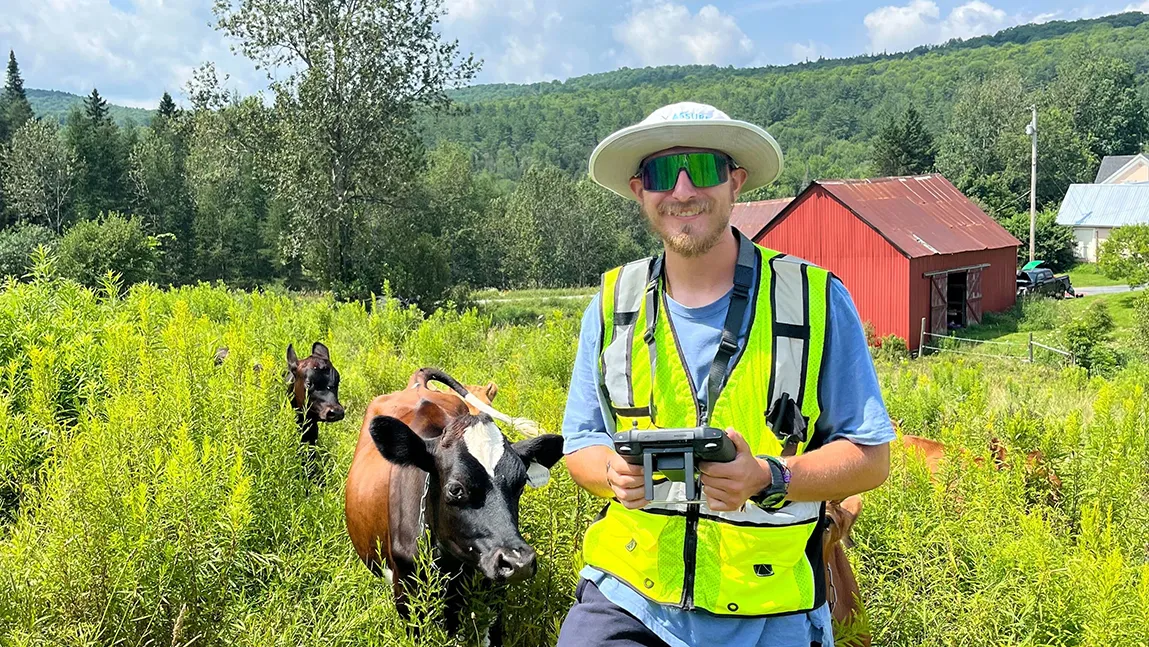Just as adding icing to a cake, salt to a stew, or chocolate chips to a cookie makes for a better, more satisfying culinary experience, complementing all that classroom time with a good internship or two is an excellent way to elevate your college educational experience. An internship offers an opportunity for hands-on learning that can give you serious insight into whether a specific field is one that might be a good fit for you post-graduation—and can also provide a window into career possibilities you never even knew existed.
But don’t take our word for it. Read on to discover how their internships are helping these six CAS students gain their own invaluable experience and figure out what comes next.
Name: Nolan Morrow (shown above)
Year: Senior
Major/minors: Geography major; computer science, geology, and geospatial technology minors
Internship: Drone pilot/spatial analyst for UVM Spatial Analysis Lab (SAL)
What he does: Conducts sUAS (drone) flights in support of local and statewide projects for research or response to disaster; the data is used to develop digital elevation models, surface models, and maps to give to stakeholders or clients to aid in decision making or damage assessment
Why he enjoys it: “We spend a lot of time outside in the field as well as in the lab, and I like the mix. I also think map making is quite cool and interesting. This past summer, I participated in hundreds of flights, doing mapping and flood damage assessments for the most impacted portions of the state. The flooding was really bad, but it was also interesting because I got to see what happens when systems fail and actually apply the processes I learned in class to real life. It's pretty impressive that we covered most of the state with only 10 or 12 pilots.”
What he’s learned: “Being able to take data from the environment and actually make it readable and understandable to somebody else is probably the most important thing I’ve learned so far. It’s cool that we’ve figured out a way to let everyone know what’s going on and what the data means even if they don’t understand the science behind it.
What’s next: “I’m working with both SAL and the Cold Regions Research and Engineering Lab [CRREL] this winter, flying drones to collect data on snow depth at the top of Mt. Mansfield. CRREL also has sensors and a radar up there for measurement, and we want to test the accuracy of the drone measurement system. If it works, using a drone might be a lot more efficient than putting people out there to gather all the data.”
What it means for the future: “I’m applying to several master’s research programs that use unmanned aerial systems, or UAS, technology so I can continue my education in remote sensing hydrology. Drones are used quite a bit now in the geoscience field and I plan to use this skill going forward because it’s such a powerful tool—very effective, very efficient, and very, very accurate. Because I’ve had pretty substantial piloting experience, I’m hoping my chances of getting into these programs are good!”
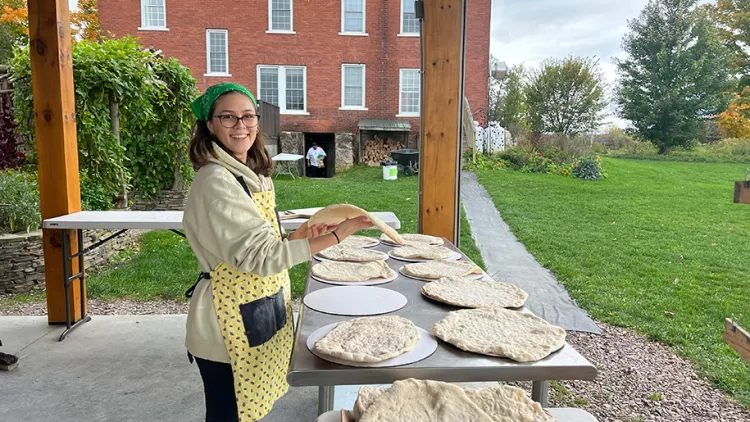
Name: Lillian Orloff
Year: Senior
Major/minor: Biology major; Spanish minor Internship: Communications and community development intern for Common Roots, a non-profit organization dedicated to food sustainability education.
What she does: Helps prepare and sell locally grown and prepared food at their "Farm to Fork Tuesdays" and "Flatbread Fridays" plus supports the organization’s social media marketing.
Why she chose it: “I was already interested in marketing, especially within organizations and companies that promote sustainability in some way. I heard about Common Roots from a friend who had worked with them over the summer, and it sounded like good fit. They’re very volunteer-based, which I like.”
Why she enjoys it: “The organization is really open to new ideas and makes it easy to explore different avenues. If you want to put in the time and help out in a new way, there are really no restrictions. Many college students don’t always know what they’re looking for, so it’s great to be in a setting that encourages exploration. Right now, they’re letting me and another intern brainstorm ideas for a winter marketing campaign that we’ll then get to plan and coordinate. I’m really excited to work on it.”
What she’s learned: “The most valuable thing I’ve learned so far is how to connect with different people. We often see the same people every week and you build a kind of relationship with them. I know their names, sometimes even their family members, and they know us. The company encourages us to make those connections, too. It’s a form of community and our customers will often volunteer to help out or mention they have a skill, like, `Hey, I’m a photographer and I’ve got some free time, so I can take photos to help you promote your organization if you’d like.’ It’s a kind of mutually symbiotic relationship with them, which is very new to me.”
What it means for the future: “I’m majoring in biology because I enjoy science, but recently I’ve developed an interest in marketing. I don’t have a ton of experience in that area, but since I work with Common Roots’ marketing manager, I’m getting to see how it works first-hand. After graduation, I’d like to pursue an MBA in sustainability here at UVM. Of course, I’m still seeing what’s out there, but for now, that’s the plan.”
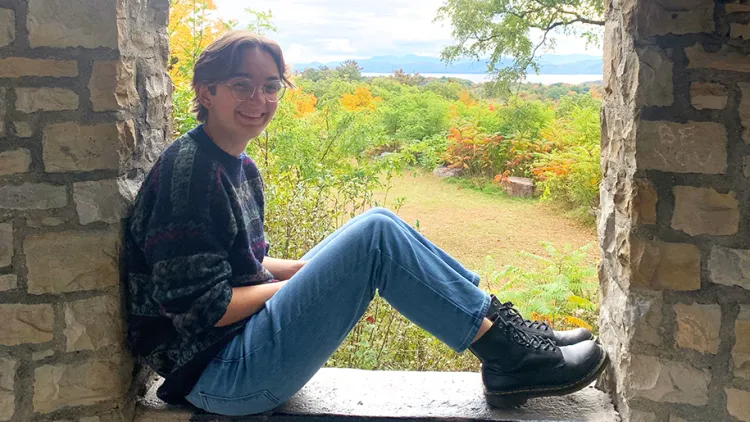
Name: August Torres
Year: Junior
Major/minors: Anthropology major w/ archeology concentration; classical civilizations and history minors
Internship: Collections intern for the Ethan Allen Homestead Museum
What he does: Organizes the museum’s archeological collections by digitizing the current paper catalog of historical artifacts, plus does odd jobs around the museum as needed.
Why he enjoys it: “The Ethan Allen Homestead Museum is a small museum, so I get to talk to so many different volunteers, which I really enjoy. I also love it when I’m working through the artifacts with our resident archeologist and he mentions something I learned about in archaeology class just a couple of days before—it’s so exciting when that happens.”
What he’s learned: “I think the most valuable thing I’ve learned so far is how to work with people in the non-profit sector. Only two of the staff positions are paid and the others are volunteers, but a lot of the volunteers sit on the boards. I watch my manager considering what everyone has to say because she wants to be supportive of the people who spend so much of their time helping the museum. She’s teaching me how to balance what she wants to do, what others want, and what’s best for the museum.”
His favorite moment: “We’ve been going through all the different artifacts we have up in the attic to figure out what we want to keep. Recently, I found a ring and my manager found a second one. They’re tarnished but otherwise in pristine condition. We think they’re wedding rings, and it’s stunning to think they were worn by people hundreds of years ago.”
What it means for the future: “I don’t know exactly what I want to do after college yet, but one of my dreams is to work as an archivist at a museum or a library—I love organizing things and working hands-on with old artifacts. This is the perfect opportunity to see what it would be like.”
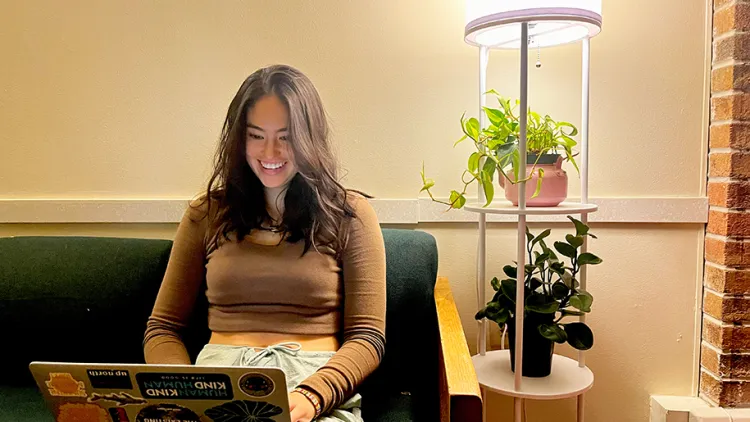
Name: Juliana Rhee
Year: Junior
Major/minor: Environmental studies major; zoology minor
Internship: Research intern at Generation Conscious, a company that makes accessible, zero-waste hygiene products (including laundry detergent sheets available in the Davis Center)
What she does: Conducts research and gathers data to understand the issues universities are facing in terms of providing sustainable hygiene products at no cost to students.
Why she chose it: “I took two really phenomenal classes when I was in high school in Hawaii, one in biology and one in environmental studies. They helped me discover a passion for people, life, nature, and the interconnectedness of it all, and I realized that we should want to take care of the earth that takes care of us. When I heard about Generation Conscious, it was so inspiring that their mission isn’t just to create something sustainable, but also something that will help with environmental justice by bridging the gap between people wanting to be sustainable and having the means to do so. A lot of companies like to talk about how they’re working to create a diverse audience, but I feel like this one really practices what they preach.”
Why she enjoys it: “I’ve done a few tabling events where I met a lot of students who came to UVM because of its commitment to sustainable practices. I love seeing how excited they get that we have this amazing resource on campus—it brings me a lot of joy and I feel like, okay, we have hope. There are a lot of people who really do care and are working to help our planet."
What she’s learned: “I think when you’re younger, it’s easy to dismiss people and think, oh, you believe this thing because you don’t care, or you don’t know the things I know. Taking environmental studies courses and working with people in the environmental field, I’m learning that if you take time to actually listen to people find out what experiences they’ve had that have shaped their perspective, it’s so much more valuable than just saying we don’t agree and walking away from the conversation. It’s so important to hear people out and understand that even if you don’t agree with them, you can still learn something, and that the best way to reach people isn’t to throw information in their face but to try to meet them where they are and find common ground.”
What it means for the future: “I’m still figuring it out, but my current thinking is that I’ll go to law school. I love science and research, but it often feels kind of futile because we already have so much information. We have solutions—we’re just not implementing them. If I go into law, I can take all this information and research and actually help make sure it’s put into practice. In terms of teaching me the outreach and communications skills that would be needed for that, this internship has been really helpful.”
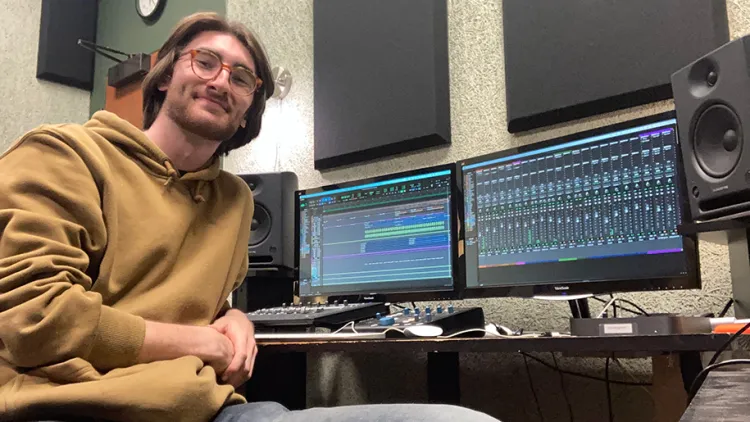
Name: Pat Boll
Year: Junior
Major/minor: Music business and technology major; film studies minor
Internship: Composing intern for Emmy Award-winning composer/producer Malcolm Francis
What he does: Assists Francis by maintaining the computer and recording set-ups, emailing clients, and (with luck—this is a brand-new internship!) contributing composition ideas
How he landed it: “There’s a student-run organization on campus called Real Love Records that sometimes has local musicians and producers come in and talk to everyone, and one day they hosted a talk with Malcolm. I follow him on Instagram, so I figured I should go. My question for him was, what could I, as a 20-year-old college junior, do right now to get started in this field? He basically said, `Ask people. You have so much power as a student to just go up to people and say you want to learn more from them.’ So, I thought, all right, and at the end I just went up to him and asked if he needed an intern. And he said, `Yes, let’s talk.’”
Why he enjoys it: “Just getting to talk to someone about composing and producing music—let alone someone who does it professionally—is both really interesting and also daunting at times. We have these really long conversations about music and its use in film and visual media and how important it is.”
What he’s learning: “It’s all about the power of connection, of thinking, this might be interesting to me, so I should go and actually talk to the person—and who knows what might come of that? I’m proud of myself that I had the confidence to say, `Can I do something to help you? And please teach me.’”
What it means for the future: “Since I was a kid, I’ve always loved film music. My parents would put me to sleep listening to the Star Wars and Superman soundtracks. As I got older, I realized that I wanted to do something in music, but I had no idea what. Then one day I was listening to the Inception soundtrack and realized that it triggered some sort of response in me that not a lot of other music does. That’s when I knew I wanted to do something with film music. I’m not sure if I want to stay in the composing field—maybe this will be just an introduction into the wider world of production and movie sound design. But this internship will open doors, and I’m excited to find out where it takes me.”
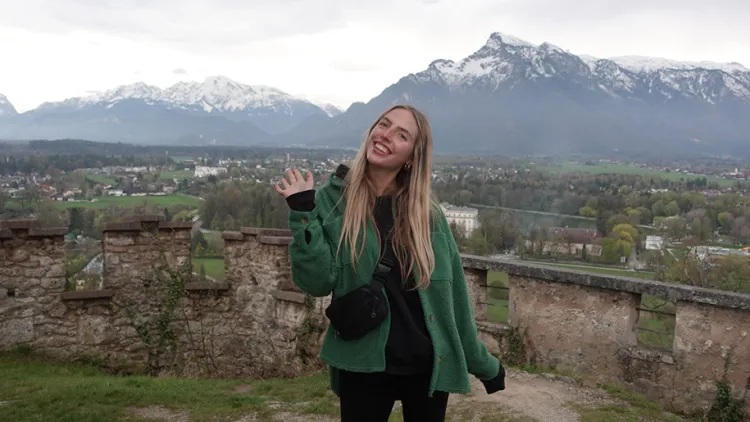
Name: Meaghan Feeney
Year: Senior
Major/minor: Political science major; history minor
Internship: Advocacy and education intern for the Alzheimer’s Association
What she does: Works with the Vermont chapter as co-facilitator for a virtual support group for people with early-onset Alzheimer’s and dementia, and works with the Massachusetts/New Hampshire chapter doing research for their upcoming conferences.
Why she chose it: “I’d done two previous internships in which I was involved in local government, and I wanted to see another side of things, so I decided to look at non-profits. I chose the Alzheimer’s Association because my grandma has Alzheimer’s and I wanted to find some way to help with that. Working here has also made me a lot more aware of what my grandma is going through, which has been really helpful.”
What it’s like to lead a support group: “We received training during the first month of the internship, but it was a bit daunting at first. Our group has 10 people. We always start off meetings talking about the highlights and lowlights of the past week, then we get into loose discussion about whatever people want to talk about. We always end with something we’re looking forward to. With every meeting, I feel a little bit more comfortable.”
What she’s learned: “Working with the support group has taught me a lot, and I’ve seen how much being in the group is helping the members. Providing them a space where they can explore their diagnosis while also being valued for the person they were before has helped me better understand what’s happening with Alzheimer’s within my own family.”
What it means for the future: “I don’t have a for-sure track that I’m thinking of—that’s why I’ve been trying different internships. But I’m definitely interested in continuing with the Alzheimer’s Association in some form, even if it’s just co-facilitating a support group outside my job. But I may stay in non-profits. I really do like it and have realized that I love working with people!”
